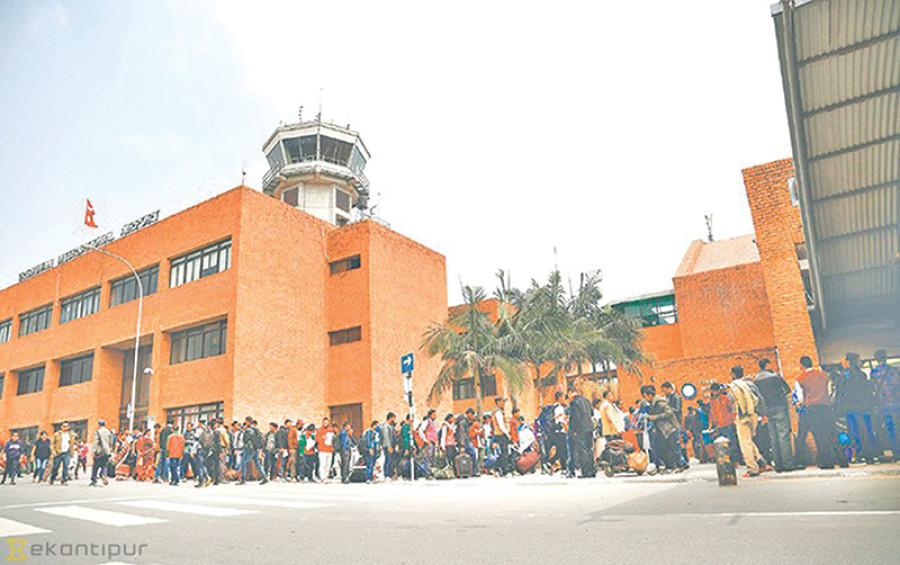Opinion
Old statute, new problems
New legislation should be passed to address the plight of migrant workers at home
Anurag Devkota
While arguing before the Supreme Court in defence of the rights of migrant workers, we fail to cite a law that explicitly governs or defends their rights. This is because Nepal does not have one. By necessity, we have always relied on the fundamental rights guaranteed by the constitution to defend our case. When asked what legal rights migrant workers have apart from blanket constitutional rights, we must solemnly reply that none exists.
The exponential rise in the migration of Nepali workers for the purpose of foreign employment, along with the rapid changes and growing challenges in the sector, requires that the existing law of Nepal—Foreign Employment Act (FEA), 2017—be updated. Nepal’s current legal framework does not adequately protect the rights of migrant workers in many respects. The stand-alone legislation governing foreign employment, the FEA and the Foreign Employment Regulation (FER), 2007, is not much concerned with rights-based protection. Instead, it primarily focuses on the procedural and regulatory aspects of foreign employment. They do not adequately address the major issues and concerns surrounding the rights of migrant workers. Provisions guaranteeing a legal basis to defend the rights of workers abroad and address their fundamental concerns remain largely missing in the current legislation.
Rights-based Migrant’s Act
The government of Nepal is currently focused on amending the FEA. However, it is unlikely that the upcoming amended legislation will integrate rights-based provisions. The government’s recently released budget plan shows that governmental representatives are becoming increasingly antagonistic towards the foreign employment sector. Instead of addressing the current problems and challenges in this sector, the speech introducing the budget stressed that the government’s ultimate goal was to curb Nepal’s high rate of foreign employment until such time as Nepali nationals abandon the sector totally.
While the establishment of employment opportunities at home is the ultimate solution, ignoring the current plight of migrant workers is neither practical nor problem-solving. Hence, considering the government’s mixed motives, amending the FEA is ill-advised. The FEA has no room to accommodate and incorporate migrant workers’ rights to the necessary scope and degree. Instead, the government should introduce new laws that can ensure workers’ rights and allow an immediate response to their hardships.
The government of Nepal should consider drafting a new act that complies with international instruments that protect the rights of migrant workers. The International Convention on the Protection of the Rights of All Migrant Workers and Members of Their Families needs to be translated into domestic laws considering the Supreme Court’s decision in Prem Chandra Rai et al v the Prime Minister’s Office in 2017. As the convention protects and covers a range of different political, civil and economic, social and cultural rights of migrant workers, domestic laws in line with the convention are well advised.
The right to take part in public affairs, that is external voting rights, the right to healthy living, rightful repatriation of dead bodies, the right to legal aid and assistance, freedom of expression and the right to compensation has been guaranteed under the convention, and hence will be reflected in the domestic law. Although these are basic and fundamental human rights of migrant workers, the legal mechanism to guarantee these rights remains a far cry for Nepali migrant workers. As such, the new act should carefully consider and incorporate these rights.
Furthermore, despite the prevailing laws, policies and regulations bestowing a plethora of rights, those rights are subject to application and execution only within the territory of the state. The jurisdiction of domestic laws is restricted to the scope of the state’s territory. The protection of migrant workers’ rights in destination countries is largely governed through international legal frameworks in the form of treaties and conventions, bilateral agreements and memoranda of understanding. The new act should provide flexible provisions for bilateral agreements with destination countries leaving room for international application of domestic laws.
For example, the Repatriation of Prisoners Act of India, 2003 includes a provision where the state could undergo a bilateral agreement with other states to return their prisoners from foreign jails. This act has led to bilateral treaties with countries like the UK, Mauritius, Bulgaria, Brazil, Cambodia, Egypt, France, Bangladesh, South Korea, Saudi Arabia, Iran, Kuwait, Sri Lanka, the United Arab Emirates, the Maldives, Thailand, Turkey, Italy, Bosnia and Herzegovina, Israel, Russia and Vietnam. Hence, considering the extraterritorial nature of labour migration, the new act should duly consider the elements of cross-border applications with labour destination countries in the Gulf and Malaysia at least.
Two possible approaches
As the government of Nepal is probing the protection of fundamental rights by introducing new bills in line with Article 47 of the constitution, the process of introducing new migrant workers’ rights-based laws will be timely and efficient at the current moment. However, the recently introduced Right to Employment Act, which aims to implement the fundamentalright of employment further, fails to substantively protect the rights of Nepali migrant workers.
Against this backdrop, the government can take one of two approaches: It can either draft a new Right of Migrant Workers’ Act or amend the Right to Employment Act so that it accommodates protective clauses defending the rights of Nepali migrant workers. The new governing law should thus be functional, problem-solving and effective, and create an enabling environment for Nepali migrant workers. When migrant workers’ rights are violated, rights-based laws will open avenues for them to access justice in a way that the rights afforded by the constitution alone cannot.
Devkota is an advocate




 13.03°C Kathmandu
13.03°C Kathmandu










